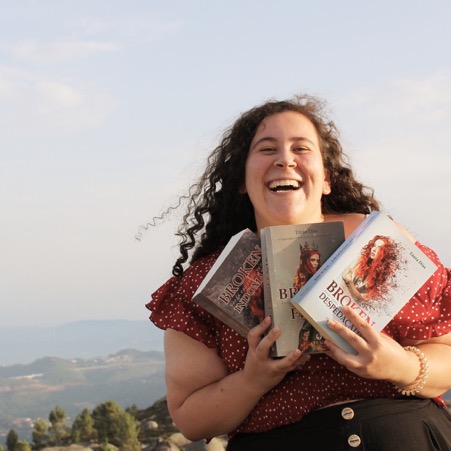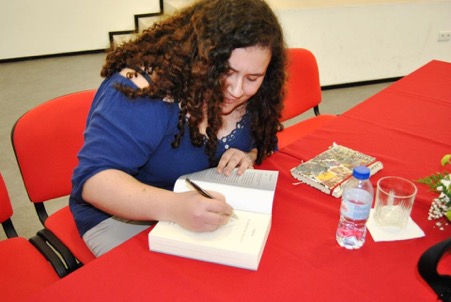The whimsical art of science research: Tales of a fantasy writer in a scientific world

When you think about scientific discovery the first thing that comes to your mind is probably not a princess riding a dragon or the gods’ wrath raining down on the world.
You probably wouldn’t even imagine that both could co-exist.
But well, they do.
In my head at least.
If we consider that my path as a scientist started when I got into college (2016) one could argue that I became a fantasy writer (2013) way before I ever thought about becoming a scientist. As such, both worlds are so woven together in my mind that some days I can’t tell them apart.
It sounds mad, I know.
But I will prove to you throughout this text that science and fantasy have more in common than you might think.
If I ask you which one of the two jobs involves talking to things that are not there (go ahead and answer, I will wait!), you answer is probably a writer. And you are right! Writers do often enjoy talking with their characters, there are not enough fingers in the world to account for all the times I’ve been caught having a one-on-one with a disobeying protagonist.
But don’t scientists do the same? When we stand in the lab, gloved hands on our waist, right in the middle of that experiment that we’ve done a thousand times and is still not working, do we not often resort to verbal encouragement with ‘’be good to me, c’mon’’ or ‘’I just need these results, would you please work?’’ are we not talking to things that – in a sense – are not there?
Still not convinced?
Let’s talk about research then. Working in research requires you to keep on learning about your field of expertise, to keep on questioning the world as you do in order to further your pursuit of true scientific knowledge.
Well, in fantasy the author never needs to reach true or evidence-based knowledge, as an author is the master and destroyer of the world he is building and all the characters within. But, an author does often need to fall into research as a means to expand his knowledge. The only difference is that an author is normally more interested in historical events, mythology, the origin of mythical creatures or old tales. At the same time, an author also needs to keep up with the literature being published (albeit, a different kind from a researcher) as reading is essential to understand narrative, how others create and portray worlds, or how to weave intricacies into characters that do not truly exist.
In sum, both need quite a bit of time put into making it work. You cannot simply wake up and decide you are a scientist now and you’re curing cancer, any more than you can wake up and decide you are going to write a bestseller.
If at this point, you are still not convinced, I’ll have to use my very last card and tell you about myself.
It’s a really long boring story that involves falling in love with a book, not liking the end of that story and deciding I would write my own. And then never stopping. While at the same time discovering about genetics and diseases and having too many questions to simply sit back and wait for others to discover the answers for me.
The first thing people ask me about when they discover I’ve published several fantasy books, is “why are you in science then?” which is funny, considering the first thing people in the literature world ask me is why I’m in fantasy if I like science.
In case you are wondering, the answer is for no particular reason other than I enjoy doing things that make me happy, and for now both do, so I never saw a reason to give one up for the sake of the other. In truth, if we look at things objectively, loving writing has only brought good things to my scientific life, so it’s really an asset more than anything.
For one, because I spend so much time thinking about and developing my writing, when it comes the time to write anything scientific, I have a better grasp on how to create an interesting narrative to present to the public. This is not to say I am a science-paper writing machine, there is a bit of that struggle that no researcher can truly avoid.
Writing requires creativity, but more than that, an attitude of not giving up when faced with a problem (which is many times I assure you — those characters never want to listen to what you say!), which I apply to my science life as well. It’s easy to fall into patterns and old habits, but sometimes the answers lie in thinking differently.
A very underappreciated skill is also being able to talk about what I do. Scientists need to have their findings clearly communicated to the public, not only in the form of research papers that will be read by peers, but also in presentations and social media posts. Although not quite the same, I feel like having started my literature career eight years ago taught me a lot about public engagement, both in person and online, which I do my best to apply to the science world as well.
Hopefully, throughout this text I’ve made you realize that science doesn’t need to be a separate world from all your other interests. It can intersect, change and grow alongside you, and that hobby you have, might just be what sets you apart from everybody else.

About the Author:
Tânia Dias is from Portugal and joined SBI as PhD student in Jonathan Bond's group this year. She has also published five fantasy novels.

